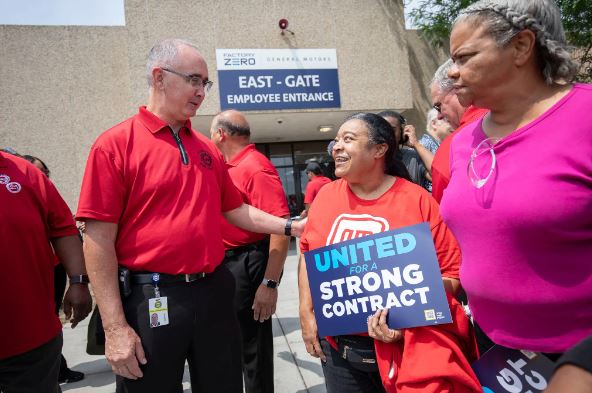On Wednesday, less than 24 hours before the contract deadline, the United Auto Workers leader said that his members were preparing for a strike against the three Detroit automakers. Initially, the strike would affect just a small number of facilities, but it might grow if negotiations stalled.
UAW president Shawn Fain has said that the union would not negotiate a new four-year contract with GM, Ford, or Stellantis when the current ones expire on Thursday. “September 14 is a deadline, not a reference point,” he told union members in a Facebook Live presentation.
In an effort to keep the first attack “limited and targeted,” he promised members the information on where to gather on Friday morning.
UAW negotiators want to acquire more bargaining power and keep the manufacturers off-balance with this method, which is a break from the union’s normal policy of waging an all-out strike against a single carmaker selected as a target.
In order to keep the majority of the 150,000 UAW members at the three firms employed and receiving paychecks, a strike at even a small number of facilities would be necessary.
The union would reimburse the health insurance costs and provide $500 per week to strikers. The union’s strike fund is $825 million, which would be enough to pay employees for three months if they went on strike against all three corporations.
Based on the assumption that CEO compensation has increased by around 40 percent over the last four years, the union’s original request to the corporations was for a four-year salary increase of 80 percent. The union has also pushed for annual cost-of-living increases to help keep earnings in line with rising prices.
The union is also demanding an end to a tiered pay structure that now has new employees starting at about half the highest U.A.W. rate of $32 an hour, as well as pensions for all workers, better retiree benefits, shorter work hours, and fewer hours worked per week overall.
Mr Fain claims that the employers, who are in separate negotiations with the union, have offered counterproposals to raise pay by about half of what the union is requesting and have done even less to meet the other requests.
Stellantis said on Tuesday that they had made their most recent offer to the union. The corporation reiterated that it is still committed to “good faith bargaining” in order to meet tomorrow’s deadline.
After G.M. and Stellantis did not reply to the union’s offers and continued to negotiate unjustly, the U.A.W. filed a complaint with the National Labour Relations Board a week ago.
Professor of Business at the University of Michigan and auto industry observer Erik Gordon predicted a strike. The other concerns are complex and cannot be fixed in the final 36 hours by dividing the difference, he added, but he was optimistic that they could reach a deal on pay.
Mr. Fain’s 40-minute speech included biblical quotations, anecdotes about his grandpa, a fellow union autoworker, and lots of strong language.
He also displayed a series of slides detailing the union’s requests and the corporations’ purported answers with regards to pay, benefits, and job security. He also made a comparison between his current administration’s attitude to the talks and that of the one they toppled last year.
Until a preliminary deal was achieved, the U.A.W. leadership seldom updated union members on the status of discussions. Mr. Fain said that the union’s members were “fed up with the company-union philosophy” and that the union’s future negotiations with corporations will be open and “not behind closed doors as in the past.”
Even while manufacturers are experiencing near-record profits, they are also struggling with the shift to electric cars. Tens of billions of dollars are being invested by General Motors, Ford, and Stellantis (Chrysler’s parent company) on research and development, new battery plants, and retooling existing manufacturing facilities to accommodate the production of electric vehicles.
The union is worried about the prospect of job losses as a consequence of the change. Since electric cars don’t need mechanical parts like gearboxes or fuel systems, fewer people may be employed in their assembly.
Each of the three firms is also working with third parties who are not covered by the U.A.W. contract to construct battery factories. After starting production late last year, employees at a G.M. battery facility in Ohio opted to join the U.A.W. and are now negotiating their own contract with the corporation.

